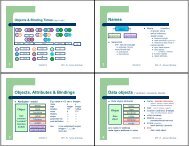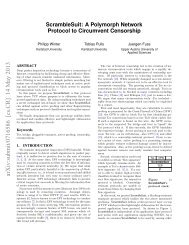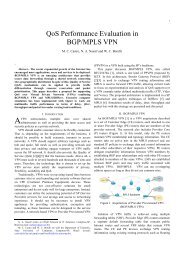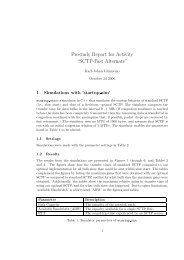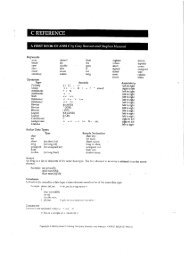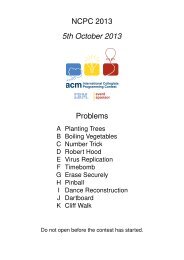Google Hacking Against Privacy
Google Hacking Against Privacy
Google Hacking Against Privacy
You also want an ePaper? Increase the reach of your titles
YUMPU automatically turns print PDFs into web optimized ePapers that Google loves.
2 Emin Islam Tatlı<br />
2 <strong>Google</strong> Search Parameters<br />
In addition to the basic search operators (i.e. +,-,.), <strong>Google</strong> supports more<br />
parameters for the advanced searches and filters its results according to the<br />
parameters provided by the user.<br />
The [all]inurl parameter is used to filter out the results according to if<br />
the given url contains a certain keyword or not. If more keywords are needed<br />
to filter, the allinurl parameter should be used. [all]intitle filters the results<br />
according to the title of web pages. [all]intext searches the keywords in the<br />
body of web pages. With the parameter site you can do host-specific search.<br />
filetype and ext parameters have the same functionality and are needed to<br />
filter out the results based on the file extensions like html, php, pdf, doc,<br />
etc. The minus sign (-) can be put before any advanced parameter and reverses<br />
its behavior. As an example, a search query containing the parameter<br />
-site:www.example.com will not list the results from www.example.com. The<br />
operator "|" or the keyword OR can be used for binding different searches<br />
with the logical OR operation.<br />
3 <strong>Privacy</strong> Searches<br />
<strong>Google</strong> can reveal many personal data when its advanced search parameters<br />
are used. We have grouped private data searches into four different sections<br />
according to the privacy level. These are identification data, sensitive data,<br />
confidential data and secret data searches.<br />
3.1 Identification Data<br />
The identification data is related to the personal identity of users. Name, surname,<br />
address, phone number, marital status, CV, aliases, nicknames used<br />
over internet, etc. are the typical examples of identification data. Some private<br />
data searches would focus on a certain person and we choose the name<br />
“Thomas Fischer” which is a very common personal name in Germany.<br />
Name, Address, Phone, etc.<br />
You can search web pages and documents which contain keywords like name,<br />
address, phone, email, etc., optionally for a certain person or within certain<br />
document types.<br />
allintext:name email phone address intext:"thomas fischer" ext:pdf



